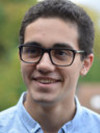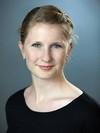Your Summer School Mentors and Organizing Team
Mentors
Dr. Boris Cheval
Boris Cheval is an exercise psychologist, health neuropsychologist, and life-course epidemiologist. He received a PhD in Movement Sciences from the University Grenoble Alpes in France. In 2014, he joined the Department of Psychology Methodology and Data Analyses Group at the University of Geneva (Switzerland). He is now a post-doctoral researcher (Ambizione scholarship) at the Swiss Center for Affective Sciences at the University of Geneva. Dr. Cheval’s research focuses on the automatic neuro-behavioral reactions involved in the regulation of physical activity behaviors. Specifically, he is trying to shed light on the exercise paradox, that is, why individuals fail to exercise regularly despite knowledge of the risk associated with physical inactivity.
- Cheval, B., Orsholits, D., Sieber, S., Courvoisier, D., Cullati, S., & Boisgontier, M. P. (2018). Cognitive resources explain engagement in physical activity and its age-related decline: A longitudinal study of 105,206 participants. SportRxiv, November 29. doi: 10.31236/osf.io/pagx6.
- Cheval, B., Radel, R., Neva, J. L., Boyd, L. A., Swinnen, S. P., Sander, D., & Boisgontier, M. P. (2018). Behavioral and neural evidence of the rewarding value of exercise behaviors: A systematic review. Sports Medicine, 48(6), 1389-1404. doi: 10.1007/s40279-018-0898-0
- Cheval, B., Tipura, E., Burra, N., Frossard, J., Chanal, J., Orsholits, D., . . . Boisgontier, M. (2018). Avoiding sedentary behaviors requires more cortical resources than avoiding physical activity: An EEG study. Neuropsychologia, 119, 68-80. doi: 10.1016/j.neuropsychologia.2018.07.029
Prof. Dr. Panteleimon ("Paddy") Ekkekakis
Paddy Ekkekakis is a Professor of exercise psychology at Iowa State University in the United States. His research examines affective responses to exercise, including their underlying cognitive and neurobiological mechanisms, and their implications for exercise behavior. His current research focuses on the neural basis of the sense of exertional fatigue and the development of the Affective-Reflective Theory of exercise behavior (with Ralf Brand). Ekkekakis has presented invited keynote lectures, seminars, and workshops in 30 cities in 15 countries outside the United States. He is the author of The Measurement of Affect, Mood, and Emotion: A Guide for Health-Behavioral Research (Cambridge University Press, 2013), the editor-in-chief of the Handbook of Physical Activity and Mental Health (Routledge, 2013), and co-editor of the Psychobiology of Physical Activity (Human Kinetics, 2006). He serves on the editorial board of Mental Health and Physical Activity; Sport, Exercise, and Performance Psychology; and the Journal of Sport and Exercise Psychology.
- Ekkekakis, P. (2017). People have feelings! Exercise psychology in paradigmatic transition. Current Opinion in Psychology, 16, 84-88. doi: 10.1016/j.copsyc.2017.03.018
- Ekkekakis, P. & Brand, R. (2018). Affective responses to and automatic affective valuations of physical activity: Fifty years of progress on the seminal question in exercise psychology. Psychology of Sport and Exercise. doi: 10.1016/j.psychsport.2018.12.018 [Epub ahead of print]
- Ekkekakis, P., Ladwig, M.A., & Hartman, M.E. (2019). Physical activity and the "feel-good" effect: Challenges in researching the pleasure and displeasure people feel when they exercise. In S.R Bird (Ed.), Research methods in physical activity and health (pp. 210-229). New York: Routledge. DOI
Prof. Dr. Ralf Brand
Ralf Brand is a Professor of sport and exercise psychology at the University of Potsdam and Affiliate Professor at the Department of Kinesiology at Iowa State University (Ames, USA). After having received academic master degrees in physical education and psychology, he started his career at the Department of Sport and Exercise Science at the University of Konstanz (GER). There he earned a doctorate degree in social sciences in 2001. He completed his postdoctoral habilitation at the Department of Exercise and Health Sciences at the University of Stuttgart (GER) in 2006 on exercise psychological interventions and health behavior, and was appointed full professor at the University of Potsdam in the year 2008. Since 2012 he serves as the Editor-in-Chief of the German Journal of Exercise and Sport Research. Dr. Brand's research focuses on the link between motivation and behavior. His recent work is characterized by an emphasis on automatic evaluative processes and the role of affect in exercise behavior change and maintenance.
- Brand, R. & Ekkekakis, P. (2018). Affective-Reflective Theory of physical inactivity and exercise. Foundations and preliminary evidence. German Journal of Exercise and Sport Research, 48(1), 48-58. doi: 10.1007/s12662-017-0477-9
- Brand, R. & Antoniewicz, F. (in press). The automatic basis of exercise behavior: Do you like exercising? In G. Tenenbaum & R. Eklund (Eds.), Handbook of Sport Psychology (4th edition). Hoboken, NJ, USA: Wiley-Blackwell.
- Brand, R. & Antoniewicz, F. (2016). Affective evaluations of exercising: the role of automatic-reflective evaluation discrepancy. Journal of Sport & Exercise Psychology, 38(6), 631-638. doi: 10.1123/jsep.2016-0171
Dr. Franziska Antoniewicz
Franziska Antoniewicz is a post-doctoral researcher and faculty member at UP Sport and Exercise Psychology. She has studied Sports Sciences with an emphasis on health prevention and rehabilitation. She earned her doctoral degree in exercise psychology in 2016 at the University of Potsdam. She brings high expertise in the reaction-time based measurement of automatic evaluations, and has a current research focus on affective forecasting phenomena in various health behavior domains.
- Antoniewicz, F. & Brand, R. (2014). Automatic evaluations and exercise setting preference in frequent exercisers. Journal of Sport & Exercise Psychology, 36, 631-636. doi: 10.1123/jsep.2014-0033
- Antoniewicz, F. & Brand, R. (2016). Learning to like exercising: Evaluative conditioning changes automatic evaluations of exercising and influences subsequent exercising behavior. Journal of Sport & Exercise Psychology, 38(2), 138-148. doi: 10.1123/jsep.2015-0125
- Schinkoeth, M., & Antoniewicz, F. (2017). Automatic evaluations and exercising: Systematic review and implications for future research. Frontiers in psychology, 8: 2103. doi: 10.3389/fpsyg.2017.02103
Organizing Team
Dr. Cyril Forestier
I am a post-doctoral researcher and faculty member at UP Sport and Exercise Psychology with a research focus on the role of self-control in dual-process views of physical activity and exercise motivation. I have finished my PhD at the University of Grenobles Alpes SENSE Laboratory, School of Kinesiology (France). Since I started researching at the University of Potsdam, I have been working intensively with psychophysiological measures of affect and especially eye-tracking methods.
You can contact me with all questions regarding your summer school application and the summer school's program.
Dipl.-Psych. Michaela Schinköth
I am a research associate and faculty member at UP Sport and Exercise Psychology. I am examining the impact of automatic affective processes on exercise behavior as well as exercising as an affective experience. My focus is on the role of automatic valuations of exercising, the underlying mechanisms of the affect-exercise behavior link and approaching the somatic core of affect via psychophysiological measures (e.g. Heart Rate Variability).
You can contact me with all questions regarding your arrival at Potsdam/Berlin (i.e. traveling), as well as general information about the summer school.
Sinika Timme, M. Sc. Psych.
I am a research associate and faculty member at UP Sport and Exercise Psychology. In my research I am interested in affective processes and the role of automatic valuations of exercising. I am fascinated by the possibilities of using psychophysiological measures (e.g. facial expressions and GSR) and mixed (multilevel) modeling to get a more comprehensive picture of automatic processes that occur and develop during exercise.
You can contact me with all question regarding accommodation during your stay in Potsdam/Berlin.








